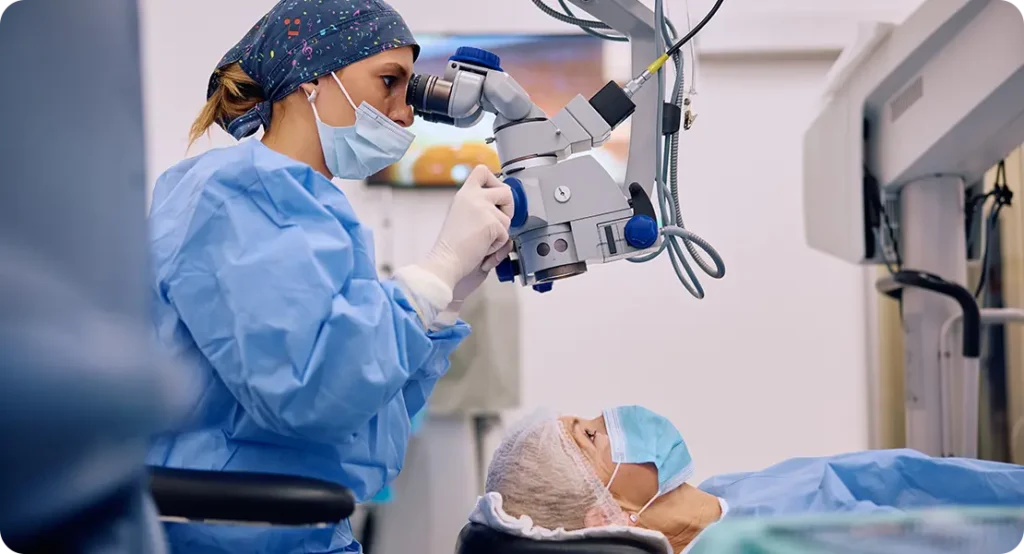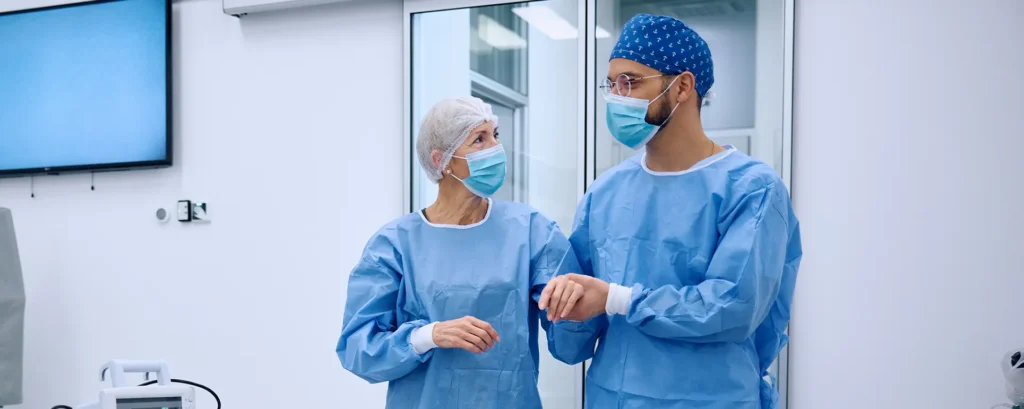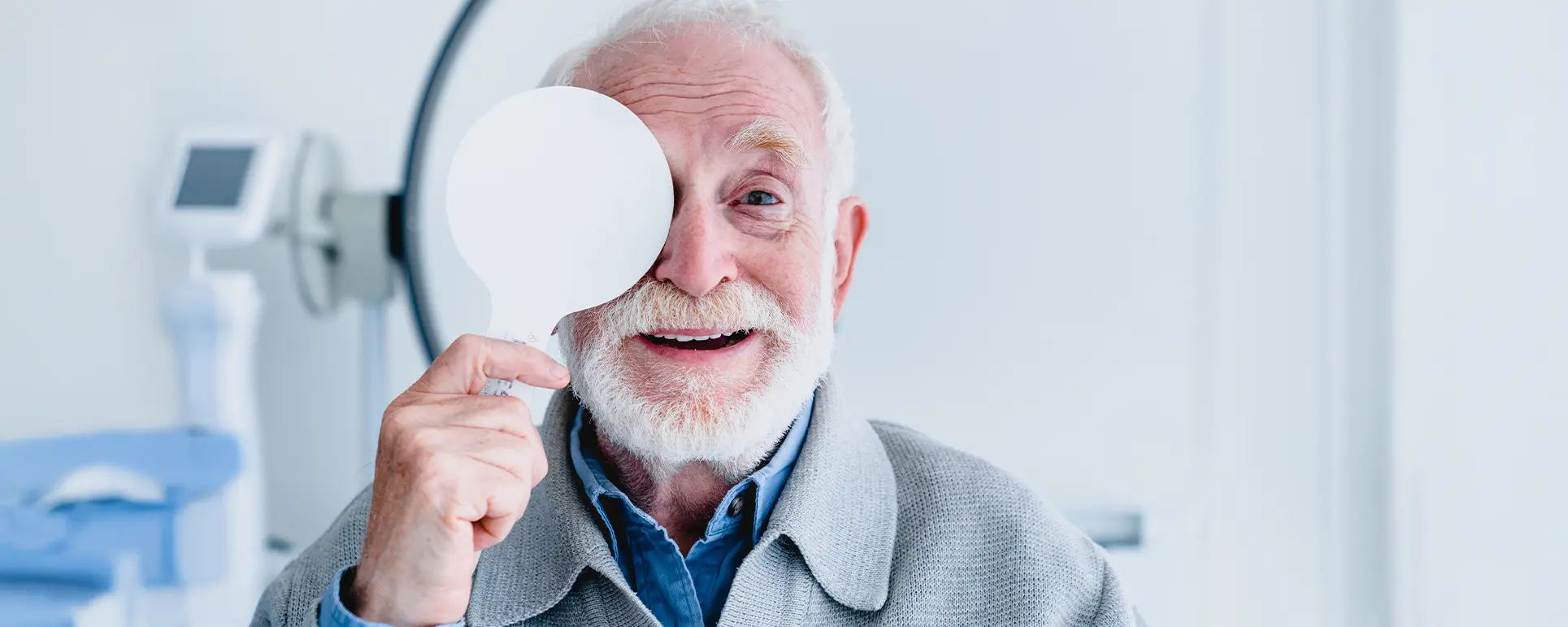Reaching your nineties is a milestone few take lightly. It’s a stage of life where every decision about health and wellbeing is considered carefully, and rightly so. Among the many questions people ask at this age, one that often comes up is: “Am I too old for cataract surgery?”
The simple answer is no. Age by itself is not usually a barrier to having the procedure. Cataract surgery in your 90s can still deliver life-changing results, improving both your sight and your overall quality of life. What matters more is your overall health, your level of independence, and your goals for the years ahead.
In this guide, we’ll explore whether cataract surgery in your nineties is safe, what benefits you can expect, and the important factors to consider before making a decision. We’ll also touch on the risks, the recovery process, and why many people in this age group still find the operation worthwhile.
Why Cataracts Don’t Wait for Age

Cataracts are not concerned with birthdays. They form when the lens inside your eye becomes cloudy, usually as part of the natural ageing process. While many people develop cataracts in their 60s or 70s, they can continue progressing into the 80s and 90s. Left untreated, they may cause severe visual impairment, impacting your ability to read, recognise faces, or even move safely around your home.
By the time someone reaches their nineties, cataracts are often advanced. This means the choice isn’t just about clearer vision, but about maintaining independence and reducing risks. Falls, for instance, are more common among older adults with poor eyesight. Restoring vision with surgery can play a significant role in reducing these hazards.
Is Age Alone a Barrier?
One of the most reassuring things to know is that cataract surgery is not denied simply because of age. Many patients well into their nineties, and even those past 100, have undergone successful procedures. Surgeons look at the bigger picture — your general health, any medical conditions, and your ability to recover.
Modern cataract surgery is performed using highly advanced techniques. It’s minimally invasive, usually takes less than 30 minutes, and can be done under local anaesthesia. This makes it safer for older adults, as it avoids the need for general anaesthetic in most cases. Age itself does not increase the risk dramatically — other health factors tend to be more important.
The Benefits of Cataract Surgery in Your 90s
The most obvious benefit is improved vision. But there’s more to it than that. For someone in their 90s, even small improvements in sight can have a huge impact. It can mean being able to read a book again, watch television comfortably, or see your loved ones’ faces clearly.
Beyond the emotional boost, there are practical benefits. Clearer vision makes moving around easier and safer. It helps with balance, reduces the risk of falls, and makes daily tasks like preparing food or taking medication more manageable. Many people also report an improvement in their mood and confidence after surgery, as they feel more connected to the world around them.
Risks and Considerations in the Nineties
No surgery is without risk, and cataract surgery in your 90s requires careful consideration. While the procedure is safe, your overall health plays a big part in recovery. Conditions like heart disease, diabetes, or mobility issues may affect how smoothly things go.
Another factor is whether you can follow the aftercare instructions. Using eye drops, attending follow-up appointments, and avoiding rubbing your eyes are important for healing. For some, family or carer support makes this possible. For others, it may be more challenging.
Complications such as infection, swelling, or retinal problems are rare but can happen. Your surgeon will weigh up the benefits versus the risks for your individual case, ensuring you make a decision that is in your best interests.
What to Expect from Recovery

Recovery times are similar regardless of age. Most people notice clearer vision within a few days, although full healing can take a few weeks. In your 90s, the main difference may be the pace at which you regain confidence in daily activities.
You’ll need to use prescribed eye drops to prevent infection and reduce inflammation. It’s also important to avoid heavy lifting or bending for the first week or so. If you have support from family, friends, or carers, recovery tends to be smoother.
For many, the improvement in quality of life makes the short recovery period worthwhile, even at this stage of life.
Setting Realistic Expectations
It’s important to remember that cataract surgery doesn’t always restore perfect eyesight. If you have other eye conditions such as glaucoma, macular degeneration, or diabetic eye disease, your results may be more limited.
That said, even partial improvement can be transformative. If cataracts are the main issue, surgery often provides a dramatic boost in clarity. Your surgeon will explain what you can realistically expect, so you go into the operation fully informed.
Supporting Independence in Later Years
For someone in their 90s, independence is a precious thing. Being able to see clearly helps you continue living safely and comfortably. It means fewer falls, fewer frustrations, and more freedom to do the things you enjoy.
In fact, many families report that after their loved one has cataract surgery, they see not only better eyesight but also a renewed sense of energy and confidence. That sense of independence — whether it’s being able to read the newspaper, enjoy hobbies, or simply walk without fear — is priceless at any age.
Stories of Success in the 90s and Beyond
Many case studies show people in their nineties experiencing excellent outcomes from cataract surgery. Some regain the ability to read without glasses, others take up new hobbies, and many simply enjoy the simple joy of seeing their grandchildren’s smiles more clearly.
Surgeons often highlight that older patients can be some of the most satisfied after surgery, because the change in their quality of life is so noticeable. Even if someone has other health issues, the improvement in vision can bring a fresh perspective to daily living.
When Surgery May Not Be Recommended
There are times when cataract surgery might not be the right choice. If someone is very frail, has advanced dementia, or has serious health conditions that make surgery unsafe, then the risks may outweigh the benefits. In such cases, other strategies such as brighter lighting, magnifying devices, or supportive care may be advised instead.
The key is to have an honest discussion with your surgeon and family. The decision should be made on an individual basis, not simply by looking at age.
FAQ: Cataract Surgery in Your 90s
1. Is cataract surgery safe for someone in their 90s?
Cataract surgery is generally considered very safe for people in their 90s, with age itself not being the deciding factor. What matters most is your overall health and whether you’re fit enough for a short procedure under local anaesthetic. Surgeons often operate successfully on patients in their 90s and even over 100, with outcomes that are comparable to younger patients. The main difference is that older patients may need more planning and support before and after the operation, but the surgery itself remains one of the safest and most effective medical procedures available.
2. How long does recovery take at this age?
Recovery from cataract surgery in your 90s usually follows the same timeline as it does for younger patients. Most people notice clearer vision within a few days, though the eye takes a few weeks to fully heal. The key consideration for people in their 90s is whether they have the support needed to use eye drops correctly, avoid strenuous activity, and attend follow-up appointments. With a good care plan in place, recovery can be straightforward, and the benefits of sharper vision often outweigh the short-term inconvenience of healing.
3. Will I still need glasses after surgery?
Whether or not you’ll still need glasses depends largely on the type of lens implant chosen and your personal eye health. Some people receive a monofocal lens that corrects distance vision, meaning they still need glasses for reading. Others may be suitable for premium lenses, such as multifocal or toric lenses, which can reduce the need for glasses at different distances or correct astigmatism. In your 90s, surgeons often focus on improving quality of life and independence, so the best lens option will be the one that fits your lifestyle and overall eye health.
4. Are there higher risks of complications in older patients?
The risks of cataract surgery do not automatically increase just because someone is in their 90s. The procedure is one of the most commonly performed surgeries in the world, and complications are rare. However, if you have other health conditions — such as heart problems, diabetes, or advanced eye disease — these can increase the risk of complications or affect recovery. Surgeons take all of this into account when recommending treatment, ensuring the benefits outweigh any potential downsides.
5. What if I have other eye conditions as well as cataracts?
Many people in their 90s have more than one eye condition, such as glaucoma, macular degeneration, or diabetic eye disease. While cataract surgery can improve the clarity of your vision, it cannot reverse damage caused by other eye problems. That said, removing the cloudy cataract often makes it easier for you to see with whatever vision you have left, and it also allows doctors to monitor and treat other eye conditions more effectively. Even when cataracts are not the only issue, surgery can still provide meaningful improvements.
6. Can cataract surgery help reduce my risk of falls?
Yes, clearer vision after cataract surgery can significantly lower the risk of falls, which are a major concern in your 90s. Cataracts cause blurred and dim vision, which makes it harder to judge distances and navigate obstacles. After surgery, patients often report feeling more stable when walking and more confident when moving around their home or outdoors. This improvement in mobility and balance is one of the key reasons why cataract surgery is often recommended even in very advanced age.
7. Is the surgery painful?
Cataract surgery is not usually painful. During the operation, your eye is numbed with local anaesthetic, which means you will be awake but comfortable. Some people feel a little pressure or a cool sensation from the fluids used during the procedure, but sharp pain is very rare. After surgery, the eye may feel slightly gritty or itchy for a day or two, but discomfort is usually mild and easily managed with prescribed drops. Pain should not be a barrier to considering surgery, even in your 90s.
8. How do I prepare for surgery at this age?
Preparation for cataract surgery in your 90s is similar to other age groups, but with added focus on your general health. Your surgeon will want to review your medical history, current medications, and any existing conditions. You’ll likely have an eye exam and sometimes a health check to make sure you’re fit for the procedure. On a practical level, it helps to arrange support from family or carers, as you’ll need assistance with eye drops and travel to follow-up appointments. Good preparation makes the whole process smoother and less stressful.
9. Will I need help after surgery?
Yes, having help after surgery is especially important in your 90s. While the procedure itself is quick and straightforward, you will need to use eye drops several times a day for a few weeks. If you have arthritis, limited mobility, or memory issues, it can be difficult to manage this alone. You’ll also need someone to accompany you to check-up appointments and to help with everyday tasks in the first few days if your vision is still adjusting. With the right support, recovery is much easier and outcomes are better.
10. Is it worth having surgery at 90+ years old?
For many people, cataract surgery in their 90s is absolutely worth it. Restoring clearer vision can bring back independence, reduce the risk of falls, and allow you to enjoy life more fully — whether that means reading, recognising faces, or simply moving around safely. Of course, the decision depends on your overall health, life goals, and support network, but for those who are suitable candidates, the improvement in quality of life can be profound. Many patients in their 90s say the only regret they have is not having the surgery sooner.
Final Thoughts
So, is it ever too late for cataract surgery? The short answer is no — even in your 90s, the procedure can make a dramatic difference. Age by itself is rarely a barrier, and many people in this stage of life benefit just as much as younger patients. What matters most is your overall health, the presence of other eye conditions, and whether you have the right support to recover smoothly afterwards.
The benefits of surgery at this age are not just about seeing more clearly. They’re about restoring independence, reducing the risk of falls, and improving your confidence in everyday life. For many, the ability to read comfortably again, watch television with ease, or see the faces of loved ones brings an enormous boost to wellbeing. Even if you already live with other eye conditions, the removal of cataracts can still provide meaningful improvements that make daily life easier and safer.
At London Cataract Centre, we see patients well into their nineties and beyond who experience life-changing results after surgery. Our team understands the unique considerations that come with operating at this stage of life, and we take every step to ensure the process is safe, comfortable, and tailored to your needs. Whether your goal is to regain independence, improve safety, or simply enjoy the little details of life again, we are here to guide you through the decision with clarity and care.
Ultimately, clearer vision is valuable at any age. In your nineties, it can mean the difference between depending on others and maintaining a sense of independence. If you or a loved one is considering cataract surgery, remember that it’s not just about improving eyesight — it’s about enhancing quality of life, preserving safety, and enjoying the years ahead with greater clarity and confidence.
Here are five Harvard-style references with working URLs you can use for your article:
References
- Rosen, E., Rubowitz, A. & Assia, E. (2009) Visual outcome following cataract extraction in patients aged 90 years and older. Eye, 23, pp. 1120-1124. Available at: https://doi.org/10.1038/eye.2008.203
- Mehmet, B. et al. (2010) Results of cataract surgery in the very elderly population. Journal of Optometry, 2(3), pp. 138-141. Available at: https://www.ncbi.nlm.nih.gov/pmc/articles/PMC3972782/
- Gutiérrez-Robledo, L. M., Villasís-Keever, M. A. & García-Peña, C. (2021) Effect of Cataract Surgery on Frequency of Falls among Older Persons: A Systematic Review and Meta-Analysis. JAMA Ophthalmology. Available at: https://www.ncbi.nlm.nih.gov/pmc/articles/PMC7987466/
- Lai, F. H. P. et al. (2014) Clinical Outcomes of Cataract Surgery in Very Elderly Adults. Journal of the American Geriatrics Society. Available at: https://agsjournals.onlinelibrary.wiley.com/doi/abs/10.1111/jgs.12590
- Ono, T. et al. (2024) Outcomes of Cataract Surgeries Performed in ≥100-Year-Old Patients. MD Journal, Volume 103 (Issue July). Available at: https://journals.lww.com/md-journal/fulltext/2024/07260/outcomes_of_cataract_surgeries_performed_in_8_eyes.39.aspx

